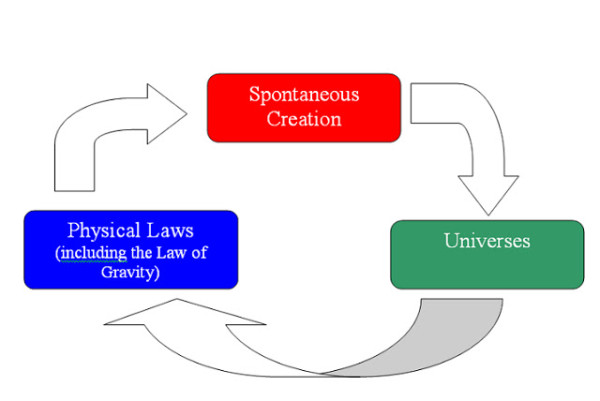There’s an old saying about giving a man enough rope, and he’ll hang himself. The idea is that if someone is wrong or lying, the longer they go on, the more obvious this becomes. Well, Bantam Books gave Stephen Hawking and Leonard Mlodinow all the rope they wanted, and the result is The Grand Design, a new book in which they argue against the necessity (and existence) of God. Here’s the core of their argument:
“[Just] as Darwin and Wallace explained how the apparently miraculous design of living forms could appear without intervention by a supreme being, the multiverse concept can explain the fine tuning of physical law without the need for a benevolent creator who made the Universe for our benefit. Because there is a law like gravity, the Universe can and will create itself from nothing. Spontaneous creation is the reason there is something rather than nothing, why the Universe exists, why we exist.”
They then explain the basic theory behind the “multiverse,” which presupposes that multiple universes exist:
“According to M-theory, ours is not the only universe. Instead M-theory predicts that a great many universes were created out of nothing. Their creation does not require the intervention of some supernatural being or god. Rather these multiple universes arise naturally from physical law.”
Let’s leave aside the question of the “multiverse” theory, which John Haldane addresses in First Things. Hawking and Mlodinow have done a thoroughly sufficient job of defeating their own argument. Let’s simply outline their three major claims above:
Claim 1: Spontaneous Creation is the reason that there is something rather than nothing, including the Universe; (“Spontaneous creation is the reason there is something rather than nothing, why the Universe exists”). This applies to all universes, meaning it applies to the entire multiverse.
Claim 2: Spontaneous Creation requires the law of gravity; (“Because there is a law of gravity, the Universe can and will create itself from nothing”; “Rather these multiple universes arise naturally from physical law”).
Claim 3: The multitude of universes are responsible for producing fine-tuned physical laws (“the multiverse concept can explain the fine tuning of physical law”)
Reduced to its bare-bones, the argument looks like this: 
The problem, of course, is that it’s circular. You can’t have a universe without it being created, you can’t have spontaneous creation without physical laws, and you can’t have physical laws without a universe.
As Hawking and Mlodinow concede, without Creation, there’s nothing. To have anything – a universe, a multiverse, the law of gravity, “finely-tuned” physical laws, anything – you have to first have Creation. And they’ve shown pretty effectively that “spontaneous” creation is impossible, since it requires physical laws like the law of gravity. So we’ve established that there was Creation, and that the universe/multiverse didn’t (and couldn’t) create itself.
On this view, it seems the only two possibilities are “God” or “circular irrational nonsense.” Hawking and Mlodinow may be brilliant physicists, but at least in this book they present themselves as poor philosophers and logicians. Their futile efforts to outline an atheistic creation story lend more credence to theism than atheism.
